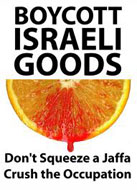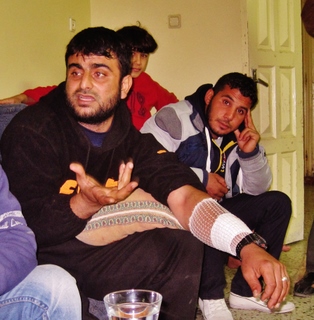Earlier this year, Israel’s embassy in Brussels resorted to moral blackmail in trying to muzzle debate about Palestine. It complained about how some members of the European Parliament held a video conference with representatives of
Hamas on the same day as an event commemorating the Holocaust (“
Israel’s Mission to the EU intimidates critics says INFORM,” International Forum on the Middle East, 8 February 2011).
Perhaps the best riposte to the embassy (or “mission,” to use its formal title) would have been to send it a copy of “On Israel and bombing,” a statement written by Bertrand Russell shortly before his death in 1970.
“We are frequently told, ‘We must sympathize with Israel because of the suffering of the Jews in Europe at the hands of the Nazis,’” the British intellectual stated. “What Israel is doing today cannot be condoned, and to invoke the horrors of the past to justify those of the present is gross hypocrisy.”
Since its inception in 2009, the
Russell Tribunal on Palestine has meticulously documented the horrors of the present (and recent past). Edited by The Electronic Intifada contributors
Asa Winstanley and
Frank Barat,
Corporate Complicity in Israel’s Occupation is a transcript of the tribunal’s November 2010 session in London. It is also required reading to understand how some enterprises are accomplices to murder. And I mean that literally.
Caterpillar is probably the first name that springs to mind for Western human rights activists when the subject of corporate crimes in Palestine is broached. We remember, in particular, the courage of American peace activist
Rachel Corrie, who was crushed to death by an Israeli soldier driving a Caterpillar bulldozer in 2003. Corrie was trying to save a home from demolition in
Rafah, in the southern Gaza Strip. This book alerts us to how vehicles made by that firm (and exported as
US military aid to Israel) are still enabling war crimes.
Palestinians killed with the aid of Caterpillar have included Samir al-Sh’obi, his pregnant wife Nabia, their three children, Anas, Azzam and Abdallah, and Samir’s father Umar. Their home in the old city of
Nablus was attacked in the middle of the night in 2002 (136). Two years later, Ibrahim Khalafallah died when Caterpillar was the quasi-official sponsor for the destruction of more than seventy homes in the Gaza refugee camp of
Khan Younis (137).
Ignorance is no defense
None of the corporations listed in this book can plead ignorance. Those who have bothered to obtain independent legal advice know that what they are doing lacks any justification.
Veolia, the French transport, waste management and water company, has hired Ove Bring, a retired professor of international law from Stockholm University, for an opinion about the
light rail system it is building to connect Israeli settlements in East Jerusalem with the Western part of the city. Bring stated that because the occupation is illegal, the light rail system can be presumed as illegal, too (80).
The aforementioned Caterpillar, as well as other suppliers of heavy vehicles to the Israeli military (such as Volvo and Daewoo), would be well-advised to read the contribution of Hocine Ouazraf, a political scientist based in Belgium. It makes clear that — under the Fourth Geneva Convention — civilian property can only be damaged by an occupying power when doing so is “rendered absolutely necessary by military operations” (6).
In precise and analytical fashion, one “witness” after another at the London session identified the occupation’s profiteers. The evidence draws extensively from the work of
Who Profits from the Occupation? — a project set up by the Tel Aviv-based
Coalition of Women for Peace in response to Naomi Klein’s brilliant dissection of modern capitalism,
The Shock Doctrine. The group’s researchers tell of how
Group4Securior (
G4S), the Danish-British private security firm, has installed surveillance equipment in several prisons used by Israel to detain and torture Palestinians, as well as in military checkpoints in the West Bank (145).
Banning settlement trade inadequate
One of the most important messages of this book is that campaigners should not merely take action against products emanating from Israeli settlements.
Dalit Baum, a Who Profits? coordinator, explains succinctly why a narrow emphasis on such products betrays a fickle grasp of the relationship between settlements and the Israeli economy.
“Just thinking about how to ban settlement trade is not enough, because the settlement production is actually tiny,” Baum said. “It’s not the main support of the settlements in their economy. Most settlers do not work in the settlement industrial zones. Their sustenance is actually based on the general Israeli economy. And this, I think, is what we have tried to show here. The main point would be to try and look at companies that are involved in the occupation, or profit from the occupation in a significant way (58).”
Other witnesses illustrate the strong bonds between political and corporate elites. Mario Franssen from the Belgian organization Intal has a deep knowledge of how the bank
Dexia has provided loans and other financial services to Israeli authorities located in settlements. The bank is chaired by Jean-Luc Dehaene, a former Belgian prime minister who has tried to placate inquisitive shareholders by claiming that providing services to settlements in East Jerusalem was not in any way problematic. And Pierre Mariani, Dexia’s chief executive, is a close associate of Nicolas Sarkozy, the French president (121).
The section in the book relating to the arms industry is especially strong. John Hilary from the campaign group War on Want cites data indicating that the
EU’s governments approved licenses for exporting more than €1 billion ($1.3 billion) worth of weaponry to Israel between 2003 and 2008 (134). The same governments have helped the Israeli arms industry to flourish by enthusiastically buying its wares.
Elbit, Israel’s leading military firm, is benefiting from a $1 billion contract to provide the British Army with
unmanned aerial vehicles (UAVs). Branded the Watchtower, such warplanes will be an even more sophisticated and lethal version of those tested out against Gaza’s civilian population during the 2008-09
Operation Cast Lead (133).
Highlighting activism to confront corporations
The litany of crimes in this book can make for grim reading. Yet an antidote is provided by highlighting instances where activists have directly confronted some of the corporations in the dock. In January 2009, one group tried to break into a factory then run by the bomb-maker Raytheon in the Irish city of Derry (the same factory had previously been the target of direct action when Israel attacked Lebanon in 2006). When they were called to a police station, the activists said they had intended to cause damage in the factory because they believed Raytheon was aiding war crimes in Gaza (156).
Five days after that attempt, a different group succeeded in breaking into a plant of the
arms company EDO in Brighton, England, where they smashed up facilities used in weapons production with hammers and threw computers out a window. During a subsequent trial,
EDO admitted that it was responsible for installing triggering devices to bombs in Israel’s arsenal. All of the six activists involved stated that they wished to prevent war crimes from being committed and were eventually found not guilty of criminal damage (162-163). Their action was heroic.
Salma Karmi-Ayyoub from the Palestinian human rights group
Al Haq, meanwhile, shows that it is possible to make an impact by taking lawsuits. She is involved in litigation against Riwal, a Dutch company that has supplied cranes to Israel’s wall in the West Bank. The case, which invokes a Dutch law on “international crimes,” remains ongoing. But raids of the company’s offices carried out last year on the order of prosecutors handling the case has at the very least brought unwelcome publicity for a firm that usually enjoys more favorable exposure; Riwal’s logo is emblazoned on jerseys worn by the soccer team
FC Dordrecht (102).
As the reader is required to digest a lot of information, some of it abstruse, I was glad that the book has the occasional lyrical touch. A moving preface by
The Color Purple author
Alice Walker describes the uprising in
Egypt during February this year as a “human sunrise (xiii).”
A rousing speech by Stéphane Hessel, the Holocaust survivor and author of the pamphlet
Time for Outrage, ends the session’s proceedings: “In no case, must we allow ourselves to be intimidated by propaganda that is trying to make the struggle for the freedom of the Palestinian people appear to be anti-Semitic,” he says. “That word should be banished once and for all from our vocabulary (177).”
Despite my enormous admiration for Hessel, I have to register unease at how he uses his wrapping-up comments to implicitly make the case for a two-state “solution.” This is all the more unfortunate, given how evidence presented to the tribunal by Fayez al-Taneeb from the Palestinian Farmers Union indicates that it is almost impossible to envisage a viable Palestinian state.
Al-Taneeb recalls that the West Bank “is divided into three cantons, isolated from each other,” before drawing parallels with the 14 Bantustans set up for black people by the apartheid regime in
South Africa (73).
No serious advocate of justice would have regarded an attempt to turn those Bantustans into a state as a substitute for ending apartheid. Similarly, it strikes me as insulting to tell Palestinians they should accept a few slivers of historic Palestine as their new country. As Hessel is a genuine friend of the Palestinian people and a passionate defender of human rights, I wish he was more open to a
one-state solution, which had respect for rights at its core.
Leaving aside my difference of opinion with Hessel on that issue, I salute his work with the tribunal and strongly recommend
Corporate Complicity in Israel’s Occupation.
David Cronin’s book Europe’s Alliance with Israel: Aiding the Occupation is published by Pluto Press



